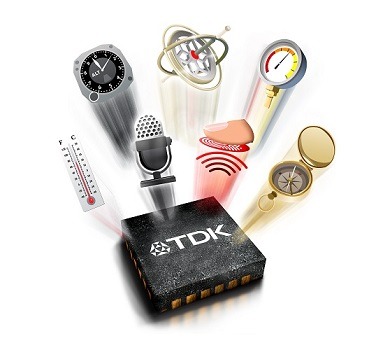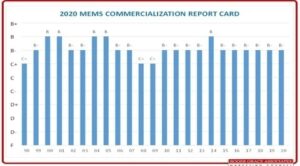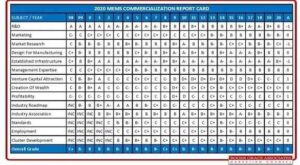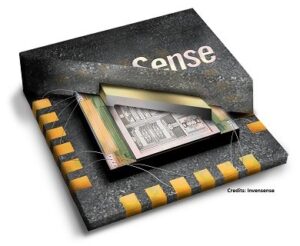
Views: 208
– “Supply chains were severely challenged and underperformed.”
Courtesy by RGRACE@RGRACE.COM: The year 2020 was crucial in global socioeconomic history, due to the Covid pandemic, which resulted in several effects which provided great impact on the scientific, industrial and commercial scenarios. Certainly, the MEMS industry community and its commercialization activities were affected, so the notes of the “2020 Report Card Study” accurately demonstrates.
According to Gartner, worldwide semiconductor revenue in 2020 was $466.2 billion (US). According to IC Insights, worldwide MEMS revenue in 2020 was $13.8 billion (US). This constitutes a 30 times higher discrepancy rate.
The question is why does this discrepancy exist? Looking at the semiconductor industry and its successful marketing is certainly a lessons-learned opportunity. The critical success factors issues for the MEMS Report Card are the specific vehicles by which this difficult task of understanding the reason for this large discrepancy can best be addressed. The subsequent call to action based on the study respondents’ grades and verbals provides valuable feedback that can be used to plan and execute strategies to address problematic issues.
Study Methodology
Sent to target audience of 75 individuals from the Roger Grace Associates database who participated in previous Report Card studies. A total of 41 questionnaires were returned after two subsequent mailings.
The methodology used was the “Delphi Method”, in which a small number of highly qualified industry experts were asked to respond by providing letter grades, from “A” to “D”, and also to include a comment (verbatim) as a justification for the grades. assigned.
Respondents had an average of 25 years of experience in the MEMS industry, thus constituting over 1,000 person-years of combined experience. This contrasts with popular polling studies, which have a large sample and are provided with a projected accuracy based on the number of survey participants.
Results obtained

Figure 1: Published annually since 1998, the MEMS Industry Trading Report Card (Report Card) monitors and reports the status of trading criteria using the results of a market study using 14 critical success factors (subjects) for the MEMS marketing success. Its purpose is to inform and guide MEMS industry participants in optimizing their successful marketing efforts. The overall score has remained at level B for the past six years, thus demonstrating the maturity of the MEMS industry. The standard deviation of the final annual grade from 1998 to 2020 was 0.54. Source: Roger Grace Associates
The final report card grade in 2020 was B- which has been maintained for the past six years and therefore demonstrates the maturity of the MEMS industry and is shown in Figure 1. However, and most interestingly, there have been a number of changes in individual subject grades and important remarks regarding the textual à-vis for this year’s Report Card. These were:
- R&D decreased from B + to B;
- market research decreased from B- to C+;
- infrastructure decreased from A- to B+;
- profitability increased from C to C+; and
- VC increased from C- to C.

Details of individual grades for the 14 disciplines of the Report Card over the years 1998 to the current 2020 are provided in Figure 2 attached.
Figure 2: While the overall score of the 2020 MEMS industry trading report remained at B-, there were several changes to the individual scores for the 14 subjects, including Venture Capital (VC) Attraction, Profitability, Infrastructure, R&D, and Research marketing, many of which had a significant attribution to COVID’s inception. The far right column with the delta header provides the change in letter sorting from the 2019 level to the 2020 level.
Covid impact
Comments (verbatims) provided by respondents addressed many of the above issues from their personal perspectives. Many of the comments addressed Covid’s impact on various issues. Especially negatively affected from a grade-change perspective were R&D, infrastructure and marketing research.
In addition to those issues addressed by the grade changes, other issues impacted by COVID based on the high level of contributions provided were directed at education and employment. Some of them include:
“Working from home negatively affected progress, as did the inability of foreign students to travel to support research at universities.” (R&D)
“The elimination of domestic and international travel has affected in-person conferences and meetings; however, this was offset by the availability of virtual events, especially webinars and social media.” (Marketing)
“Supply chains were severely challenged and underperformed.” (The infrastructure)
“COVID accelerated new investments in biomedicine and supported the commitments of the later phases.” (VC Attraction)
“A reduction in workforce, overhead, and R&D and marketing budgets have increased profitability.” (Profitability)
Summary and Conclusions

The final score of the 2020 Report Card remained at B- with a standard deviation from 1998 to 2020 of 0.54. Changes in the 14 disciplines / critical success factors had three disciplines lowering one grade (R&D, infrastructure and market research) and two disciplines increasing one grade (VC attraction and profitability). In addition to the notes, many valuable comments covering the 14 subjects were received from the 41 respondents.
With the recent increase in delta variant-based COVID cases in the third quarter of 2021, it is likely that the Report Card for 2021 could be affected in the same way as it was for 2020.
The continued development and issuance of the MEMS industry’s annual Marketing Report Card study is expected to provide information and valuable guidance to the MEMS industry community to help them successfully overcome barriers to MEMS commercialization and continue to function as a mechanism to help formulate strategies and tactics to achieve this effectively.
Being an optimist, I subscribe to the quote of the famous German poet Johann Wolfgang von Goethe (1749-1832)… “That which does not kill you makes you stronger”. I believe that during these past and ongoing stressful times, our best has been brought (and continues to be) and we can embrace our newfound solutions and strategies to overcome the problems we will continue to face in the future and thus capture new opportunities within the “ new normal business environment”.
For MEMS marketing, this is especially applicable when dealing with marketing and infrastructure issues, where many contributions have been made and the main challenges addressed with new solutions being offered and deployed. The good news… new challenges bring new opportunities… carpe diem!
Bulletin 2020’s expanded final report, which includes many valuable verbatims and recommended future actions , is available on the Roger Grace Associates website www.rgrace.com.
The author wishes to thank all the individuals who participated in this important research study for their kind, valuable, and continuing contribution to the MEMS Report Card and the MEMS marketing community.
REFERENCES: [1] Grace, R.H. (2020). Marketing in a Recession and How to Survive the Effects of the Social and Financial Crisis on Marketing and Business Strategies [Newsletter]. Sensors Daily, April 8th. Available at: www.rgrace.com
Author: Roger H. Grace, Chairman at ROGER GRACE ASSOCIATES Contact: RGRACE@RGRACE.COM
Source: Roger Grace Associates www.rgrace.com
Leave a Reply